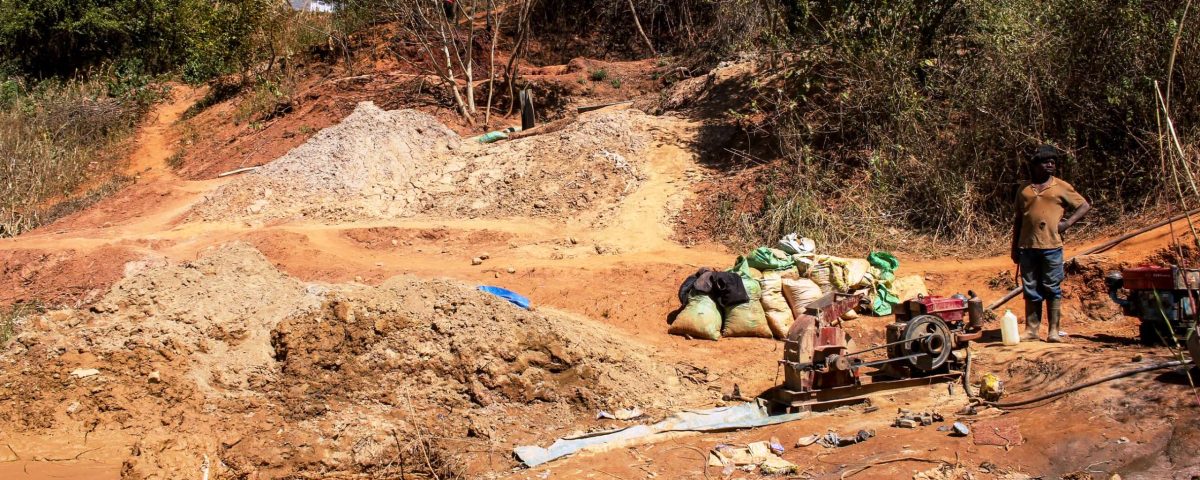
Feli Nandi to sample her forthcoming new single at Manicaland Motoring Club family show
August 23, 2024
Gusheshe Leisure Centre construction works gear up ahead of Jah Prayzah show Friday
August 29, 2024Mutare CSOs consortium calls for consistency, impartial enforcement of Gvt riverbed mining ban

Artisanal miner at work in Penhalonga. The devastating land degradation and water pollution effects of riverbed mining in Penhalonga by artisanal miners and some small scale gold miners where land reclamation is not being done due to either lack of Environmental Impact Assessment (EIA) compliance certificates or lack of oversight by the regulating authorities is a matter of serious concern says the Centre for Research and Development (CRD). (Picture credit: Centre for Research and Development)
…reveals EIA compliance certification being ignored in Penhalonga mining operations
Ngoni Dapira
MUTARE based non-profit organization, Centre for Research and Development (CRD) in collaboration with Penhalonga Youth Development Trust, Penhalonga Residents and Ratepayers Trust, Tsvingwe Residents Association and Zivai Community Empowerment Trust have filed a governmental appeal on behalf of the Penhalonga community to inquire on the validity of the Environmental Impact Assessment (EIA) compliance certificates of Artisanal and Small-scale Miners (ASM) operating at the Redwing Mine concessions in Penhalonga.
The consortium of civil society organisations (CSOs) also called on government to enforce without bias its recent ban on riverbed mining, a shift from past trends where some ‘sacred cows’ were given special mining grants. They said unsustainable mining practices and illicit trade in the extractive industry is crippling the economy.
The CSOs consortium said communities near and surrounding the gold mining areas in Penhalonga in Mutasa South are concerned about the lack or unjustifiable renewal of some EIA compliance certificates for some small scale gold mining operations in the area, citing “inadequacies in land rehabilitation plans as well as environmental and social oversight.”
The governmental appeal statement was read out last week Wednesday following the pronouncement by government to reinstate the ban on all riverbed mining activities with immediate effect. Speaking during a post-Cabinet media briefing in Harare last week Tuesday, the Information, Publicity and Broadcasting Services Minister Jenfan Muswere said government realized that riverbed mining activities have destroyed rivers and intends on stepping up efforts to ensure responsible and sustainable mining practices countrywide.
“Cabinet had noted that ever since its (riverbed mining) commencement in 2011 across the country’s rural provinces, large-scale and mechanical alluvial mining or riverbed mining has resulted in water pollution, siltation, degradation of river channels and disruption of riverine ecosystems,” said Minister Muswere during the post-Cabinet briefing.
Government has been going back and forth on riverbed mining over the years, which shows divergence of views over the issue by top government officials. Chinese companies have reportedly been at the forefront of getting special grants to undertake most of these mining projects along riverbeds, as well as Belarusians, including at the incumbent mining projects in Penhalonga.
Several concerns have been raised over the degradation of river channels in the country as gold panners, now called artisanal miners, continue with their operations. However, in Penhalonga the operations are also being intensified by ‘unscrupulous’ small scale miners who are mechanized, operating with earth moving equipment and heavy duty tipper trucks. Most of these small scale miners reportedly do not have EIA compliance certificates but somehow remain operational without being closed down by the regulating authorities revealed members of the CSOs consortium.
“This action aims to challenge, demand the revision or annulment of permits deemed illegal, and denounce the numerous environmental and social violations associated with riverbed mining and mining without EIA compliance certificates,” read out the statement by the consortium .
The gold mining tributes cover a vast area where ore is extracted and processed, as well as alluvial gold mining, which is leading to the pollution of Mutare River, with little to no concern about the environmental impact and effects on surrounding communities. The areas mostly being mined are near the high density suburb of Tsvingwe and along the highway to Muchena, opposite the Penhalonga shopping centre.
Last year in June, the Parliamentary Portfolio Committee on Defence, Home Affairs and Security that visited the Penhalonga mining operations under Better Brands Mining Company, which is operating under some Redwing Mine concessions, wrote a report titled, “The Security of Minerals: Illicit Trading in Minerals and Mineral Leakages.”
Amongst the many issues raised in the report, one of them was on lack of capacity by the regulating authorities to contain artisanal mining in Penhalonga due to various reasons.
“The Committee was informed by the workers that, the Ministry of Mines and Mining Development, ZRP and Environmental Management Agency (EMA) were struggling to handle the illegal mining, milling and trading activities happening in the Penhalonga area. The local police station has no vehicle for patrols and effective enforcement of the law,” read the report.
The report stated that a lot of gold leakages were happening through artisanal mining at the tributary granted to Better Brands where there are over 800 pits and 400 hammer mills operating.
In addition, the report noted that there were many gold buyers, both registered and unregistered, operating in the area. Furthermore, there were over 13 illegal crossing points into Mozambique and it was believed that those routes were being used to smuggle gold out of the country.
The consortium of CSOs said the mining operations are now more mechanized and grossly affecting ecosystem species habitats, agricultural lands and polluting Mutare River, whilst the air pollution effects on residents from the dust raised from the gravel roads by earth moving equipment and tipper trucks has become unbearable and is suffocating residents.
“Without an EIA compliance certificate which promises to minimize negative impacts on the environment and local communities, the gold mining operations have caused river pollution in Mutare River, air pollution, soil erosion, the destruction of ecosystem species habitats, as well as cracks in homes caused by explosions, with no compensation,” says the consortium.
Penhalonga Youth Development Trust director Clinton Masanga said given this background, government should demonstrate its commitment to enforce and end riverbed mining without favouratism.
“We are therefore calling for the government to strengthen the existing legal provisions on riverbed mining by re-enacting section 3 of SI 92 of 2014 to ensure just application of the law on riverbed mining and to end all forms of political interference in gold mining activities in Penhalonga, which allows regulating and law enforcement agencies of government to exercise their mandate without victimization,” said Masanga.
He added that government must also ensure that all mineral looters and perpetrators of environmental crimes in Mutare River and Penhalonga must be held to account for revenue loss, destruction of infrastructure and rehabilitation of the river system for future generations.

L-R: CRD director James Mupfumi and Penhalonga Youth Development Trust director Clinton Masanga during the presser.
CRD director James Mupfumi thanked government for the timely intervention and said the current state of affairs in Penhalonga violates Section 73 of the Constitution on the rights of citizens to environmental protection. Mupfumi said the unsustainable mining operations would lead to ghost townships as the area will become inhabitable at the rate that artisanal miners operate willy-nilly. He added that there is massive gold leakages and illicit dealings, which means there is little benefit to Government.
“We applauded government in 2014 for positively responding to our call to suspend DTZ-OZGEO mechanized alluvial gold mining in Mutare River. We thought our right to environmental health had been upheld when Government went further to enact statutory instrument (SI) 92 of 2014 that banned alluvial mining in the riverbed. We were however taken aback in 2018 when government arbitrary repealed progressive clauses in SI 92 of 2014 to allow riverbed mining with SI 258 of 2018. In 2020 government again banned mining in national parks and along riverbeds after we exerted pressure, only to see the practice resurface a few months after the ban. Then the recent ban now. Why is government going back and forth on this injustice to mining communities and our environment?” said Mupfumi.
In January 2023 EMA suspended the mining operations of Better Brands Mining citing that their mining shafts were not up to expected standards of the Ministry of Mines and Mining Development, but somehow the company resumed operations under the same deplorable operating conditions.Then sadly, the aftermath, early this year, an emergency operation had to be done to rescue 15 small-scale gold miners who had been trapped for four days after a shaft collapsed at the Redwing Mine concessions.

Tsvingwe Residents Association service delivery committee member Evermore Mubayi
Tsvingwe Residents Association service delivery committee member Evermore Mubayi said artisanal miners are now destroying community infrastructure such as bridges and the community centre at Penhalonga Township. He said contrary to the Mines and Minerals Act which does not allow mining within 50 metres of homesteads, artisanal miners are invading areas near people’s homes.
“The Penhalonga community needs to be educated on its rights, whilst the mining companies need to be responsible and plough back into the community where it is extracting the gold and destroying the environment. Artisanal mining on the other hand is a complex system difficult to monitor but we believe if law enforcement agencies are deployed without political interference, we will see positive visible results,” said Mubayi.
According to Fidelity Gold Refinery (FGR), the country’s exclusive buyer of the yellow metal, from January to July this year, Zimbabwe produced 17 279 kilogrammes up from 16 855kgs in 2023. Over 60 percent of Zimbabwe’s gold is produced by small scale miners and artisanal miners, of which many of them reportedly source the gold through riverbed mining. This therefore means the recent ban is expected to impact many of the country’s gold miners and face resistance if government does not commit to forceful law enforcement.
According to the National Development Strategy One (2021 to 2025), the mining sector accounts for 60% of the country’s export revenues. However, the mining industry has also been experiencing mineral leakages negatively affecting the sector’s potential contribution to the socio-economic transformation of the country.



2 Comments
Yea these enforcers have a lot to do especially in overhauling their internal work ethics – otherwise they will not deliver expectations herein interpolated…
Very true. Implementation of policies and to capacitate the law enforcers to execute their duties well is key. Also joint operations to cut resources and achieve intended outcome is needed.